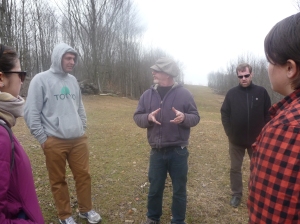Day 5
Written by Jordan Phillips
Today we met with an expert on the fracking issue, Seamus McGraw. He authored the first major book on the modern fracking process in Pennsylvania, called End of Country, and is pretty well respected on both sides of the issue. He tours the country nationally educating the public on the costs and benefits on fracking.
We spent all day with Seamus, just immersed in casual conversation with all 9 of us on his couch. It was a great, and sometimes heated, exchange of ideas and viewpoints. We later took a hike with him on his property and around his gas well. We also met with his wonderful mom and his water expert friend, Brian Oram, who taught us about the processes for analyzing well water.
To summarize our conversation with Seamus, he said that acknowledged all the following negative effects are happening because of natural gas, but there are benefits too.
The following are happening (and this is not even a comprehensive list):
-Water wells are being contaminated with methane and toxic chemicals
-Contrary to popular belief, natural gas could have an even higher level of green house gas emissions than oil because methane is over 100x more powerful at trapping heat in the short term.
-Diesel spills are common from rig sites, contaminating the land.
-The gas companies have meager regulations and special exceptions from federal environmental laws, and those controlling regulatory offices (mainly the EPA and Pennsylvania DEP) cannot adequately test and monitor the gas companies.
-Gas companies are cutting corners in every possible way of the fracking process at the expense of public safety including (1) using the cheapest piping (called class 1 piping) that is more likely to fail and, (2) they are creating pits of toxic fracking fluid with thin plastic liners that sit in the open air and rip then leak into the groundwater.
-The rocks underground unearthed during the drilling process are radioactive and dumped in landfills, which run off into water sources.
-Gas companies rush to drill wells prematurely (as famously reported in Dimmock), which results in violations and mishaps
-There is corruption in local politics (schools, churches, local newspapers)
-Crime, traffic, and accidents have risen dramatically in the local community
-The gas companies tell people what they want to hear and leave out important details in order to get a lease.
-Compressors end up emitting toxic fumes that smell disgusting and cannot be escaped.
-People working on and living near wells are having negative health effects like higher cancer rates, nosebleeds, headaches, and stomach aches. Also, their doctors have gag orders and are not allowed to disclose gas industry related illnesses (to protect the industry).
-When people’s water becomes contaminated due to fracking, the companies offer to provide people with bottled water, but they have to sign non-disclosure agreements (meaning the people aren’t allowed to say why they are receiving bottled water).
But:
-Regulation has improved because of all the public criticism of fracking.
-Natural gas is extracted with less environmental damage than coal and has emits less carbon dioxide than coal (though natural gas releases methane into the atmosphere which is far more powerful at trapping heat than carbon).
-Some temporary jobs are created in PA to set up the wells for things like mixing chemicals and driving trucks.
-Corporations (Domestic and International companies own wells in PA) can export the natural gas for more profits.
-People who lease their land will receive royalty checks for the length of the wells production (10-20 years).
My take: Framing any argument against coal is a straw-man argument. Anything compared to coal seems better. But when one compares “natural” gas to renewables, I don’t even think twice about my new unabashed support for renewables. The slightly extra cost is worth it because the real costs of fossil fuels (see above) are not being priced properly by our society. If people saw the negative environmental and human impacts that come from fossil fuels every time they switched on their lights or stove, I think people would care much more about what kind of fuel they consume. It’s convenient for everybody outside of PA because they do not see the effects of their electricity use. They just turn it on and it is there for them. So, I urge people to find out the truth of where their electricity comes from and take action accordingly. It’s 2013, global warming is real and the negative consequences are real.
—
We then walked around town and chatted with some very nice locals. We had dinner at a local pizzeria, hung out in a local music store, and even got free soap from “Sassy Albert Soaps.” The prevailing opinion from storeowners was that they were happy with the increased foot traffic from drillers, but they were aware of the health and pollution problems in the community.
—
Finally we finished with a night tour of “flaring,” a process where methane gas is released into the air and ignited for 1-2 weeks after the toxic fracking fluid has been removed from the well. This creates a huge 30-foot high fireball flame that can be seen for miles. The companies say the methane needs to be released because there is too much pressure from methane in the well, but we could also smell the chemicals coming from the well. In fact, the people in our van could taste a plastic-orange film in their mouth and got headaches. We were about 1000 feet away from the flaring, but people’s homes were even closer, and they would have to live with the flame for at least a week. I did not even mention that the flaring is as loud as an airplane engine and that it goes on 24 hours a day until the flaring is over. Can you imagine living next to that?



Recent Comments